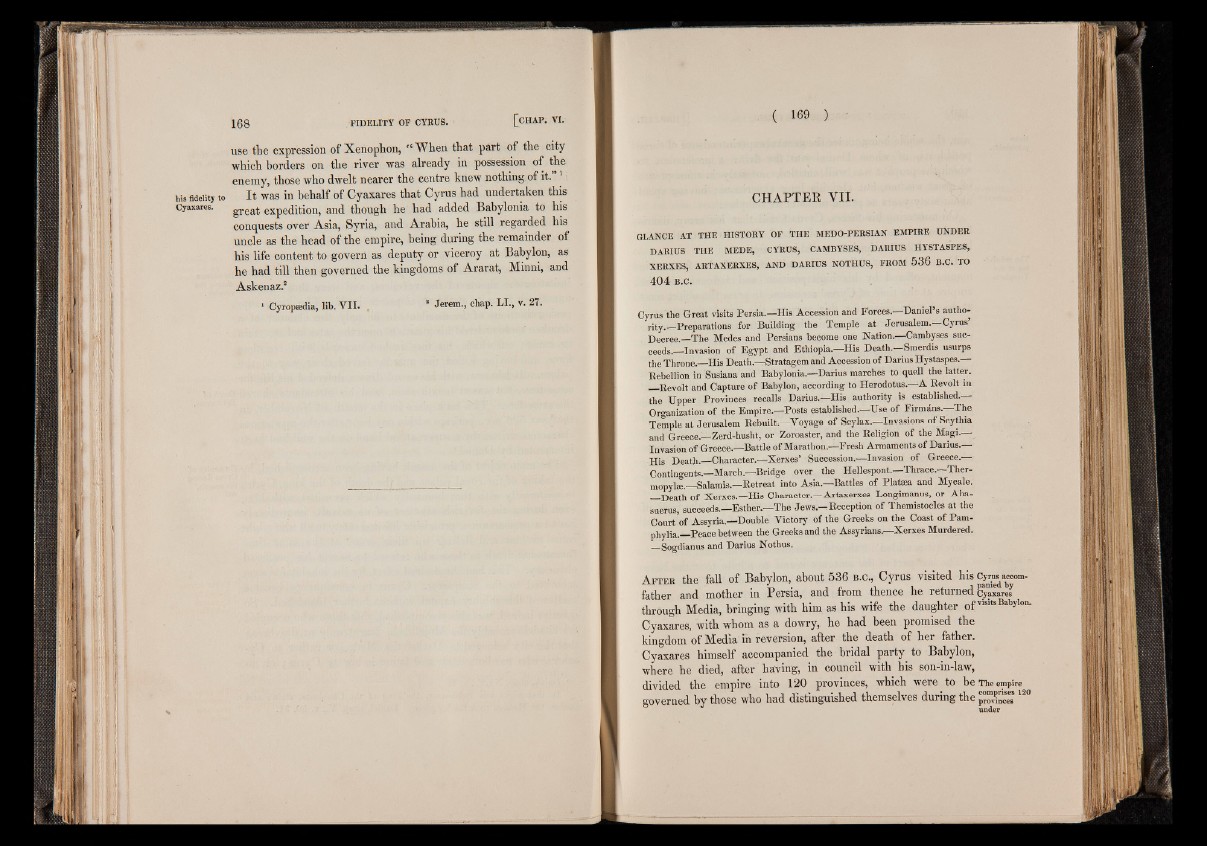
his fidelity to
Cyaxares.
use the expression of Xenophon, ei When that part of the city
which borders on the river was already in possession of the
enemy, those who dwelt nearer the centre knew nothing of it.
It was in behalf of Cyaxares that Cyrus had undertaken this
great expedition, and though he had added Babylonia to his
conquests over Asia, Syria, and Arabia, he still regarded his
uncle as the head of the empire) being during the remainder of
his life content to govern as deputy or viceroy at Babylon, as
he had till then governed the kingdoms of Ararat, Minni, and
Askenaz.2
1 Cyropsedia, lib. V I I . . 2 Jerem., chap. L I., v. 27.
CHAPTER VII.
GLANCE AT THE HISTORY OF THE MEDO-PERSIAN EMPIRE UNDER
DARIUS THE MEDE, CYRUS, CAMBYSES, DARIUS HYSTASPES,
XERXES, ARTAXERXES, AND DARIUS NOTHUS, FROM 536 B.C. TO
4 0 4 B.C.
Cyrus the Great visits Persia.—His Accession and Forces.—Daniel’s authority
.—Preparations for Building the Temple at Jerusalem. Cyrus
Decree. The Medes and Persians become one Natron.—Cambyses succeeds.
Invasion of Egypt and Ethiopia.—His Death.—Smerdis usurps
the Throne.—His Death.—Stratagem and Accession of D arius Hystaspes.
Bebellion in Susiana and Babylonia.—Darius marches to quell the latter.
Revolt and Capture of Babylon, according to Herodotus.—A Revolt in
the Upper Provinces recalls Darius.—His authority is established.—
Organization of the Empire.—Posts established.—Use of Firmdns.-^The
Temple at Jerusalem Reb u ilt—Voyage of Scylax.—Invasions of Scythia
and Greece.—Zerd-husht, or Zoroaster, and the Religion of the Magi.—
Invasion of Greece.—Battle of Marathon.—Fresh Armaments of Darius.—
His Death.—Character.—Xerxes’ Succession.—Invasion of Greece.—
Contingents.—Ma rch—Bridge over the Hellespont.—T h ra c e—Thermopylae—
Salamis.— Retreat into Asia.—Battles of Platsea and Mycale.
Death of Xerxes.—His Character.—Artaxerxes Longimanus, or Ahasuerus,
succeeds.—Esther.—The Jews.--Reception of Themistocles at the
Court of Assyria.—Double Victory of the Greeks on the Coast of Pam-
phylia.—Peace between the Greeks and the Assyrians.—Xerxes Murdered.
—Sogdianus and Darius Nothus.
A f t e r the fall of Babylon, about 536 B.C., Cyrus visited his Cynwaccom-
father and mother in Persia, and from thence he returned cy^xareJ
through Media, bringing with him as his wife the daughter ofvisitsBabylon-
Cyaxares, with whom as a dowry, he had been promised the
kingdom of Media in reversion, after the death of her lather.
Cyaxares himself accompanied the bridal party to Babylon,
where he died, after having, in council with his son-in-law,
divided the empire into 1 2 0 provinces, which were to be The empire
governed by those who had distinguished themselves during the province*
under